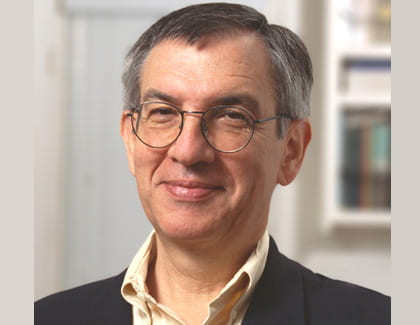The accidental activist
A conversation with history professor Jon Wiener

After a 25-year legal battle that took him all the way to the U.S. Supreme Court, history professor Jon Wiener recently closed the book on his campaign to obtain secret files the FBI kept on John Lennon’s anti-war activities in the early 1970s. Was it an obsession that made Wiener pursue the case so long? A conviction that the last unreleased pages contained explosive secrets? UCi magazine talked with Wiener and discovered that, not only did he correctly predict the contents of the final documents released last December, he would have given up the chase long ago – but history got the better of him.
What first prompted your interest in the FBI files on Lennon?
John Lennon was shot Dec. 8, 1980, and because I was a Lennon fan and aspiring journalist, I wanted to write an article about him. Most of the tributes were focused on his years as a Beatle, but nobody was writing about his “give peace a chance” period, in 1971-72, when he was protesting the Vietnam War. I had my topic, but being a historian I wanted documents. The FBI had recently released amazingly detailed files on Martin Luther King Jr., so I wondered if there were any files on Lennon. Then things got out of hand.
The FBI did have files on Lennon but wouldn’t release them citing national security interests. Why did you fight for their release?
I wondered what was in the files, because they contained information from the period when Nixon was running for re-election. The surveillance was a clue Nixon considered Lennon a significant political force. In 1983, the ACLU of Southern California took the case, suing under the Freedom of Information Act for release of the files. I thought it would take a couple months to resolve. There are historians who say they’re going to devote 20 years to studying slavery or World War I. But spending 25 years on this was not my idea. My goal was simply to write an article. Soon I had enough information for a book.
Most of the files were released in 1997. Why did you fight for those last 10 blacked-out pages?
Actually, I thought we should let the case drop. I’d published a book in 1984 and a second one in 2000, and after that it would have been fine with me to call it quits. We already had a good idea of what was in the withheld files – mostly trivial stuff about Lennon’s anti-war statements in London. But the ACLU doesn’t give up. They believed a principle was at stake. The withheld information was not a threat to national security, and it seemed an abuse of the Freedom of Information Act. I thought, “We’re never going to win this.” Fortunately, I was wrong.
What was your reaction last December when the last files were released?
I was surprised – and exhausted. For two decades, every time there was a new legal development, the media would re-discover the case all over again. I got tired of recounting for the thousandth time that Nixon tried to deport Lennon. After 25 years, I’m very glad I won’t have to tell the story anymore.
Would you do this all over again?
Oh, yes. It was exciting because this was about something bigger than John Lennon; it was about government abuse of power. And it’s relevant today. Government secrecy is a big issue again. Democracy requires that citizens know what their government is doing. But the Bush administration has dramatically increased the number of documents classified as confidential, secret or top secret. Documents that were once in the public domain have been reclassified as off-limits. It’s time to end this excessive secrecy, and for people to demand more openness from their government. Even if
it means going to court.